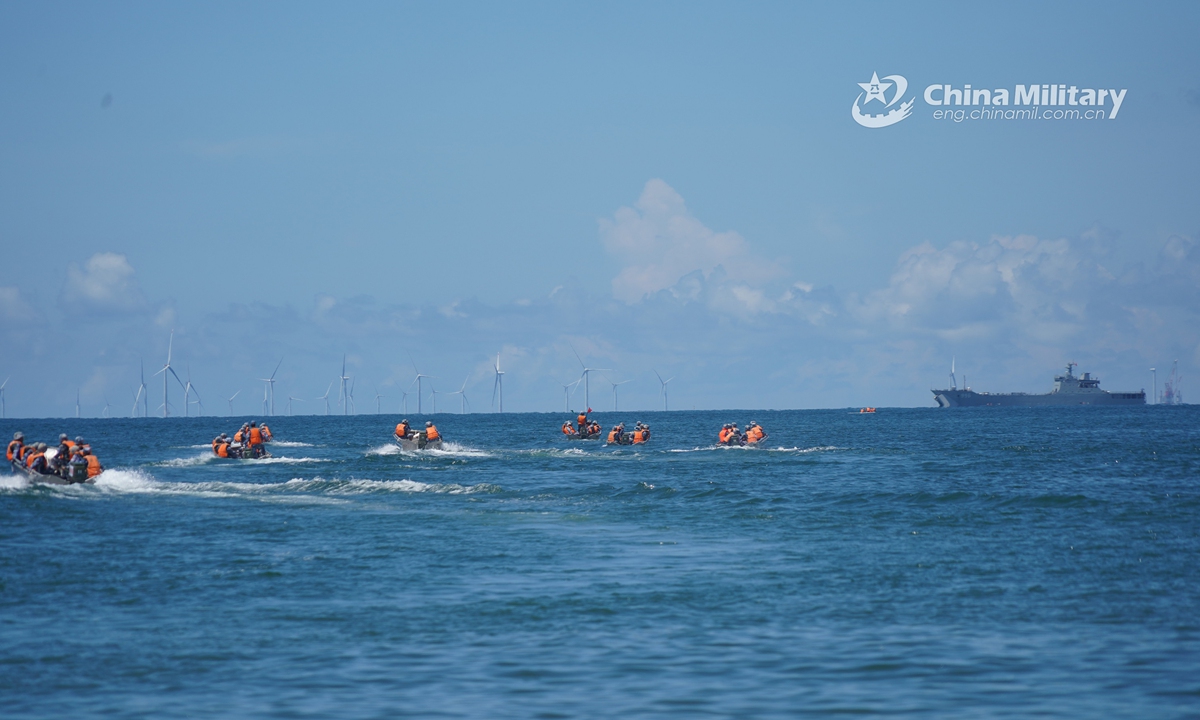Where does China’s full confidence in resolving Taiwan question come from?

The night view of Taipei, Southeast China's Taiwan, June 20, 2019. Photo: Xinhua
A senior Chinese official has reaffirmed the determination of the Communist Party of China (CPC) to realize the national reunification at an annual forum to boost people-to-people exchanges cross the Taiwan Straits, further underscoring the CPC's full confidence in achieving this goal.
The clear signal was sent out as the US played the "Taiwan card" on the occasion of its holding the so-called summit for democracy, and at a time when the Taiwan question is widely considered the top issue of concern between China and the US for 2022, according to some experts, who also firmly believed that with regard to this power wrestling among the Chinese mainland, the US and the island of Taiwan, the Chinese mainland will always have the upper hand in deciding when and how to resolve the Taiwan question.
Wang Yang, a member of the Standing Committee of the Political Bureau of the CPC Central Committee and chairman of the National Committee of the Chinese People's Political Consultative Conference, said that realizing unification is the historic mission and unshakable commitment of the CPC, and "we have full confidence in achieving the goal." He made the remarks on Saturday at the 13th Straits Forum in Xiamen, East China's Fujian Province.
Our confidence comes from the Chinese public warmly expecting and supporting reunification from the bottom of their hearts and firmly safeguarding this idea, Wang said, noting that we are ready to make efforts with the utmost sincerity to win the prospect of peaceful reunification, but we will never leave any room for "Taiwan independence" separatist activities.
This was the second strong warning to secessionists in Taiwan and the US-led Western forces behind them in a month, after Chinese President Xi Jinping warned in a virtual meeting with US President Joe Biden in mid November that the intention of some Americans to use Taiwan to contain China is "just like playing with fire" and that "whoever plays with fire will get burnt."
In recent months, the secessionist DPP authority has been increasingly colluding with the US-led West in escalating provocations on the Taiwan question, using the "salami-slicing" tactics and trying to tread on the red lines the mainland has set on the matter.
A series of reckless moves, such as visits by US congressmen to the island, sending an aircraft carrier to the Taiwan Straits and trying to help the island expand its so-called diplomatic room by inviting it to the "summit for democracy" in recent months, have all increased the chances for the Taiwan question to turn into a major flash point in which China and the US could see dangerous conflicts, as a number of prominent experts and scholars predicted at the Global Times Annual Forumon Saturday that the Taiwan question will be the top issue of concern between China and the US for 2022.
Potential for danger
"If we rank the major points that could cause dangerous conflicts between China and the US in the future, I would say the Taiwan question would be the first, then the South China Sea and the East China Sea," retired PLA navy rear admiral Yang Yi said at the forum on Saturday.
On the Taiwan question, both China and the US have been preparing in terms of planning and strength, Yang said, noting that if a strategic accident leads to conflict, the two countries, as major powers, will not easily make any compromises due to national pride.
The Biden administration has been escalating provocations on the Taiwan question for the past year. For example, it has allowed senior US officials such as US Secretary of State Antony Blinken to recently adopt aggressive rhetoric, such as "any move by China to 'invade' Taiwan would have terrible consequences," and some US politicians have wantonly challenged the one-China principle by visiting the island or supporting the secessionist DPP authority.
In late October, Taiwan's regional leader Tsai Ing-wen confirmed for the first time, in an interview with CNN, that US troops are present on the island, which sparked public outrage, as some wondered whether such a claim would be regarded as stepping on the red lines of the one-China principle. Experts also warned that Tsai would face consequences from the mainland including more military activities.
Some experts at the Global Times forum laid out several scenarios where the secessionists in Taiwan, in collusion with the US, would create extreme danger or war by stepping on the red lines of the mainland such as formally declaring "independence", amending their so-called constitution, allowing US troops to be stationed on the island, joining the UN and establishing official ties with the US or Japan.
For example, if US troops really were stationed in the island to offer protection to the Taiwan authorities on the island, rather than provide training sessions from time to time, then "it would be a highly dangerous situation," Zhou Zhihuai, director of the academic board of the Taiwan and East Asia Research Center of Central China Normal University, said at the forum on Saturday.
Most experts who attended the first panel of the forumsaid that they believe the tense situation surrounding the Taiwan Straits will develop the most rapidly.
There were some other scenarios laid out by some experts at the second panel concerning non-peaceful means being used to solve the Taiwan question, such as secessionists in Taiwan using any name or measure to separate the island from China, an incident causing any major secession of Taiwan from China, or the possibilities for peaceful reunification completely vanishing.
The US will not allow the DPP authority to take the risk of dragging it into a regional maelstrom. If the balance of China-US power leans toward China within three to five years, the US may be more restrained, making the resolution of the Taiwan question more straightforward, said Shen Dingli, a professor from Fudan University's Institute of International Studies, at the forum.

Several rigid-hull inflatable boats (RHIBs) attached to a brigade of the PLA Navy Marine Corps make their way to the beach-head during a maritime amphibious assault training in mid July, 2021. (eng.chinamil.com.cn/Photo by Liu Yuxiang)
Future prospects
In his address at the Straits Forum, Wang Yang, China's top policy adviser, also noted that as the CPC has the ability to transform the disaster-stricken Chinese nation from standing up and growing prosperous to becoming strong, it also has the ability to build a moderately prosperous society in all respects on the once poverty-stricken mainland with a large population, and of course, the CPC has the ability to make Taiwan compatriots enjoy better lives.
"My intuition is that the Chinese mainland has put the resolution of the Taiwan question on the agenda," Jin Canrong, associate dean of the School of International Studies at the Renmin University of China, said at the Global Times forum, referring to one of three factors affecting the situation in the Taiwan Straits.
Some plans concerning the local economy and transport have recently been unveiled, sparking speculation about the country's overall plan for reunification. For example, a senior official from the Taiwan Affairs Office of the State Council said in Octoberthat after the reunification, Taiwan's peace and tranquility will be fully guaranteed and its economic development will be enhanced.
Also, the national outline of a comprehensive transportation network includes the construction of a branch route from Fuzhou in Fujian to Taipei on the island of Taiwan, a spokesperson from the Taiwan Affairs Officesaid on November 24.
Experts agree that extreme dangers, including a war, remain unlikely in the short term despite there still being risk, with most believing that the Chinese mainland is controlling the development of the cross-Taiwan Straits situation, and that it is the only actor with enough strength to launch a massive operation to resolve the Taiwan question once and for all when necessary.
"If the Taiwan authorities want to push for a peaceful solution with the mainland, or the US wants to reach an agreement with China peacefully on the matter, they should do it as soon as possible," otherwise there is nothing they can get via negotiations in the near future, as China doesn't need to consider any compromise to realize a peaceful end to the Taiwan question, Jin said.
Photos
Related Stories
- U.S. provocative remarks, actions only make further tensions in Taiwan Straits
- Taiwan's very few remaining "allies" urged to follow Nicaragua's case
- Mainland urges U.S. to stop erroneous actions over Taiwan question
- Nearly 2,000 Taiwan compatriots to attend 13th Straits Forum
- U.S. harbors ill intentions by inviting Taiwan to "democracy summit"
Copyright © 2021 People's Daily Online. All Rights Reserved.










